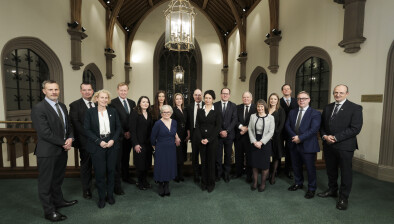NI Court of Appeal: Father’s appeal of return order refusal dismissed

Northern Ireland’s Court of Appeal has dismissed a father’s appeal against the High Court’s refusal to make an order for the return of his children from Northern Ireland to the Republic of Ireland.

About this case:
- Citation:[2025] NICA 55
- Judgment:
- Court:NI Court of Appeal
- Judge:Lady Chief Justice Siobhan Keegan
Delivering judgment for the Court of Appeal, Lady Chief Justice Siobhan Keegan explained that “whilst we may have approached some aspects of the analysis differently, we cannot say that the judge was wrong to refuse a return order. In particular, we consider that acquiescence was a strong defence in this case.”
Melanie Rice KC and Niamh Devlin appeared for the appellant instructed by Bernard Campbell & Co Solicitors, Suzanne Simpson KC and Victoria Ross appeared for the respondent instructed by Harte Coyle Collins, and Sinead O’Flaherty KC with Anna McHugh instructed by the Official Solicitor represented the interests of the children.
Background
The appellant and respondent, a Sudanese couple, travelled to various countries before reaching the Republic of Ireland. The appellant claimed asylum in the Republic of Ireland, whilst the respondent unlawfully took their children to Northern Ireland in October 2024 and claimed asylum there for herself and their children.
The appellant subsequently sought the return of the children through proceedings issued on 5 December 2024. The respondent accepted that at the relevant time, the appellant had been exercising custody rights, had not consented to children’s move to Northern Ireland and that the children’s habitual residence at the relevant time was the Republic of Ireland.
The respondent resisted the making of a return order pursuant to the Child Abduction and Custody Act 1985 based on the exceptions provided for by Article 13 of the Hague Convention on the Civil Aspects of International Child Abduction 1980, namely the acquiescence of the appellant, grave risk of physical, psychological harm or otherwise intolerable situation on return, and the objections of the two elder children.
The respondent alleged that she and the children were the victims of domestic violence and coercive control perpetrated by the appellant and that the children did not want to return to the Republic of Ireland.
In the High Court, Mr Justice Humphreys refused the application for a return order.
Issues on appeal
The appellant alleged that the trial judge fell into error in finding that the Article 13(1)(a) exception of acquiescence had been established by the respondent, that the Article 13(1)(b) exception of grave risk had been established by the respondent, in holding that the undertakings offered as protective measures were insufficient, in holding that an objection to return by the children had been made out, and in refusing to order the return of the children.
The Court of Appeal
At the outset, Lady Chief Justice Keegan highlighted that the establishment of just one of the exceptions to return was sufficient for the appellant’s case to fail.
Having considered the relevant legal framework, the court turned to the issue of acquiescence. Noting that the leading authority remained the decision in Re H (Minors) (Abduction: Acquiescence) [1998] AC 172, the court considered the evidence and found that the trial judge was right to make his factual finding that acquiescence was established.
In this regard, the Lady Chief Justice referred to an email of 26 December 2024 sent to the court office by the respondent, which recorded the couple’s agreement that it would be in the best interests of the children to stay in Northern Ireland and that the appellant would notify the court of his consent for the children to continue residing there.
The court further noted that thereafter, the appellant’s legal representatives had filed a position paper which stated that the parties had reached consensus on all matters relating to their children and attached a draft order which stated inter alia that the children would stay in Northern Ireland and that the appellant could withdraw his proceedings.
The Court of Appeal opined that the court “has not seen such a clear example of an agreement with an accompanying draft order in any other case that has come before it on this point”, whilst pointing out that the appellant only changed position in April 2025 after he allegedly sexually assaulted the respondent on a visit to Northern Ireland.
The Lady Chief Justice emphasised that a strong instance of acquiescence was before the court, for reasons including that the court was entirely satisfied that the appellant had engaged with the respondent on reaching the agreement and had provided her with the court’s email, and that notwithstanding his change of position, the appellant had not swiftly tried to achieve return given the court adjournments agreed.
Proceeding to consider whether the trial judge was correct to find that a grave risk to the child had been established, the Court of Appeal acknowledged the high threshold required to establish this exception and the restraint required when adjudicating upon the factual findings of a first instance judge.
The court was satisfied that there was independent support for the respondent’s assertions in the form of complaints made by the respondent about the appellant to the police in 2023 in Malta and in 2025 in Northern Ireland.
Applying the applicable legal test, the Court of Appeal was satisfied that notwithstanding the appellant’s denials, the risk of harm to the children, if the allegations were true, was high where the allegations involved physical violence against the respondent and the children, sexual violence including rape against the respondent, and a range of controlling behaviours.
The court was further satisfied that the children themselves had referred to concerning aspects of home life to the Official Solicitor, leading the Official Solicitor to state in her report that she was “compelled to express grave concern for the subject children … and that ‘their recent disclosures paint a deeply disturbing picture of their lived experience’ and ‘may amount to significant harm’”.
The court also considered the package of protective measures offered by the appellant, noting that whilst it could be concluded that the proposed undertakings would be effective in mitigating the risk of grave harm, the alleged potential for non-compliance was strengthened by the appellant’s pattern of behaviour, including his resiling from the agreement reached between the parties, raising a valid concern that he would not honour the proposed undertakings.
The Lady Chief Justice then considered the children’s objections, observing that recent authority had “warned against an overly technical approach to this issue”. Having regard to the contents of the Official Solicitor’s report in which the children expressed that they “really liked” living in Belfast and did not enjoy the Republic of Ireland, the apparent absence of coaching and the children’s ages and maturity, the court found no error on part of the trial judge in relying on the children’s objections as part of his consideration.
Conclusion
Accordingly, the Court of Appeal dismissed the appeal.
OP v GL [2025] NICA 55










